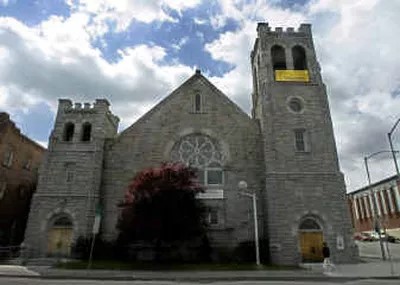Evangelical Congregational Church

The Evangelical Congregational Church is a network of churches that exercise the congregational form of government. They belong to the National Conference which is a fellowship of congregations supporting the local congregations through a Bishop of several Conference Ministers. They have a desire to share their faith with others so evangelism is very important to them.
The Evangelical Congregational Church is Methodist in policy and Arminian in doctrine. There is an emphasis upon the inspiration and integrity of the Bible and in the fellowship of all followers of Christ.
The purpose of the Evangelical Congregational Church is to know Christ and to make Christ known. Their mission is to elevate churches proclaiming Christ. The Evangelical Congregational Church is committed to the authority of the Bible, the critical role of prayer and pursuit of holiness.
The Evangelical Congregational Church is led by pastors and laity who have a passion for God and a drive to reach the lost. They obey the Great Commission as set down by Jesus Christ. They renovate declining churches into healthy, disciple making churches that are committed to evangelizing communities to become that which God has called them and to proclaim the Gospel to the world.
The Evangelical Congregational Church is set up in local congregations where the pastor is in charge. Each Evangelical Congregational Church has its own governing body. The Official Board or Ministry council gives direction to the church program.
History
The Evangelical Congregational Church originally was known as the Evangelical Association. The association was established by Jacob Albright who was a traveling evangelist minister from Lancaster County, Pennsylvania. The newly organized church grew as ministers were sent to cities to preach the Gospel.
Jacob Albright received instruction from Adam Reigel who was a lay preacher of the Church of the United Brethren of Christ. Needing church relationship, Jacob them joined a Methodist class led by Isaac Davis and devoted himself to prayer and fasting. He structured the church organization of the Evangelical Association in the Methodist class structure. The churches tradition emphasized the essential devotion to Christ through prayer, Bible studies and Spiritual accountability.
Jacob Albright brought a close relationship between the doctrines of Methodism to the Evangelical Association church. The Evangelical Congregational Church of present day continues to attach importance to the doctrines of Methodism.
The first National Camp Meeting Association for the Promotion of Holiness was established by The Evangelical Association and held at Vineland, New Jersey in 1867;in 1868 it was held in Manheim Pennsylvania. These camp meetings were based on the doctrine of “entire sanctification” which is a state of righteousness and true holiness which every regenerated believer may achieve. They believe this sanctification is achieved through the cleansing from all sin, loving God with the whole heart, soul, mind and strength, and loving their neighbor as themselves.
Both minister and the laity of the Evangelical Association voted to renew the emphasis of the doctrines of the churches.
There was chaos in the General Conference of the Evangelical Association in 1887. One man refused to follow another man’s directive. One of the bishops criticized the Japan mission, and the editor of the church magazine refused to print the article. This caused a trial with charges of official misconduct and unchristian like conduct against the editor of the magazine.
The General Conference became split in 1891 and both parties called for a General Conference. The majority party was called the Esherites and the minority party was called the Dubsites after the Bishop Rudolf Dubs. Every one supporting the minority part was excluded from the denomination after the authority of the majority party prevailed. The congregations of the minority party lost their church buildings because the buildings were owned by the majority denomination. There were no reconciliations. The Minority was forced into a new denomination in 1894 calling themselves the United Evangelical Church.
The United Evangelical Church emphasized congregationalism and responded to the abuses of power by the Evangelical Association. The powers of the General Conference were confined and the ownership of their church property was placed in the control of the local congregation. The local churches elected lay delegates to the Annual Conference where there would be equal representation of lay and minister delegates to the General Conference. The United Evangelical Church introduced evangelistic outreach foreign mission projects. Originally, congregationalism was to authorize the laity for ministry and to protect the local churches from control of a denomination that became confused in doctrine and policy.
Both the United Evangelical Church and the Evangelical Association were united and changed their name to the Evangelical Congregational Church after 1922.
Belief
The Evangelical Congregational Church believes God is the one true and living God, and eternal Being, a Spirit without body, indivisible, of infinite power, wisdom and goodness, the Creator and Preserver of all things, visible and invisible. They believe in a Trinity, on one substance and power and exist together in the Father, the Son and the Holy Ghost. They believe Jesus Christ is the incarnate Son of God, through His virgin birth, sinless life, sacrificial death on the Cross, and glorious resurrection and ascension. They believe Jesus offers new life to all who receive Him by faith. They believe Jesus Christ will return to this world, and bring an end to history as is now known. They believe Jesus Christ is the sole Mediator between God and man. They believe He gave his life a ransom for all and by His death on the cross made a full, perfect sacrifice, oblation, and satisfaction for the sins of the world. He rose from the dead and ascended into heaven, where He lives as the great High Priest and King. They believe Jesus Christ will inaugurate the final judgment and He welcomes believers into His eternal kingdom.
The Evangelical Congregational Church believes the Holy Spirit is the indwelling for believers and gives them a desire and the ability to follow the Biblical standards of conduct in their personal lives. They believe the Holy Spirit proceeds from the Father and the Son, and is the same eternal nature, power and glory.
The Evangelical Congregational Church believes the Bible is their final authority for faith and Christian living. The Holy Scriptures includes the canonical books of the Old and New Testaments.
The Evangelical Congregational Church believe all humans are created in the image of the Creator and are immensely worthy. They believe the world is under the influence of sin because of personal human rebellion against God which makes humankind separated from God. Without the intervention of the Grace of God this would be the eternal state of all humankind. They believe the Scriptures are given by Divine inspiration and contain the will of God concerning man in all things necessary to salvation.
The Evangelical Congregational Church believe justification is the act of God by which man yields themselves in full confidence to Jesus Christ the Savior. They believe they are acquitted form guilt of sin and accounted righteous in His sight. They believe they are justified, not by their works they perform, but by faith in Him who died for them.
The Evangelical Congregational Church believe salvation comes through the mediation of Jesus Christ and provides freedom of will to accept or reject the offer of eternal life.
The Evangelical Congregational Church believe the soul of man is immortal and, on its separation from the body at death, continues in a conscious state of existence in the world of spirits. They believe they either enter into bliss or undergo torment this is according to their lives they have lived.
The Evangelical Congregational Church believes there is an appointed day where God will judge all men by Jesus Christ. They believe all the dead shall be raised up by the power of God through Christ. They believe the good shall come into eternal life of glory, those who have been wicked shall be adjudged into everlasting punishment.
The Evangelical Congregational Church believe the Holy General Church is the great body of believers who confess the Lord Jesus Christ and have life in Him. The individual church is a congregation of Christian believers in pure worship of God, where the Holy Word is preached, and His commandments and ordinances are sacredly observed.
The Evangelical Congregational Church believes the sacrament of Baptism is the formal application of water to an infant or adult believer, in the name of the Father and Son and of the Holy Spirit. They believe it is a visible sign and seal to the person to consecrate them in a Holy Covenant.
The Evangelical Congregational Church believes the Lord’s Supper is a token of love and union when Christians come together, they also believe it is a sacrament instituting the memory of the sufferings and death of Christ. They believe those who worthily receive and partake of the body and blood of Christ by faith, not in body but in spirit, when they eat the broken bread and drink from the blessed cup.
Cite Article Source
MLA Style Citation:
Holstein, Joanne “Evangelical Congregational Church:.” Becker Bible Studies Library Jan 2006.<https://guidedbiblestudies.com/?p=2680,>.
APA Style Citation:
Holstein, Joanne (2006, January) “Evangelical Congregational Church:.” Becker Bible Studies Library. Retrieved from https://guidedbiblestudies.com/?p=2680,.
Chicago Style Citation:
Holstein, Joanne (2006) “Evangelical Congregational Church:.” Becker Bible Studies Library (January), https://guidedbiblestudies.com/?p=2680, (accessed).


